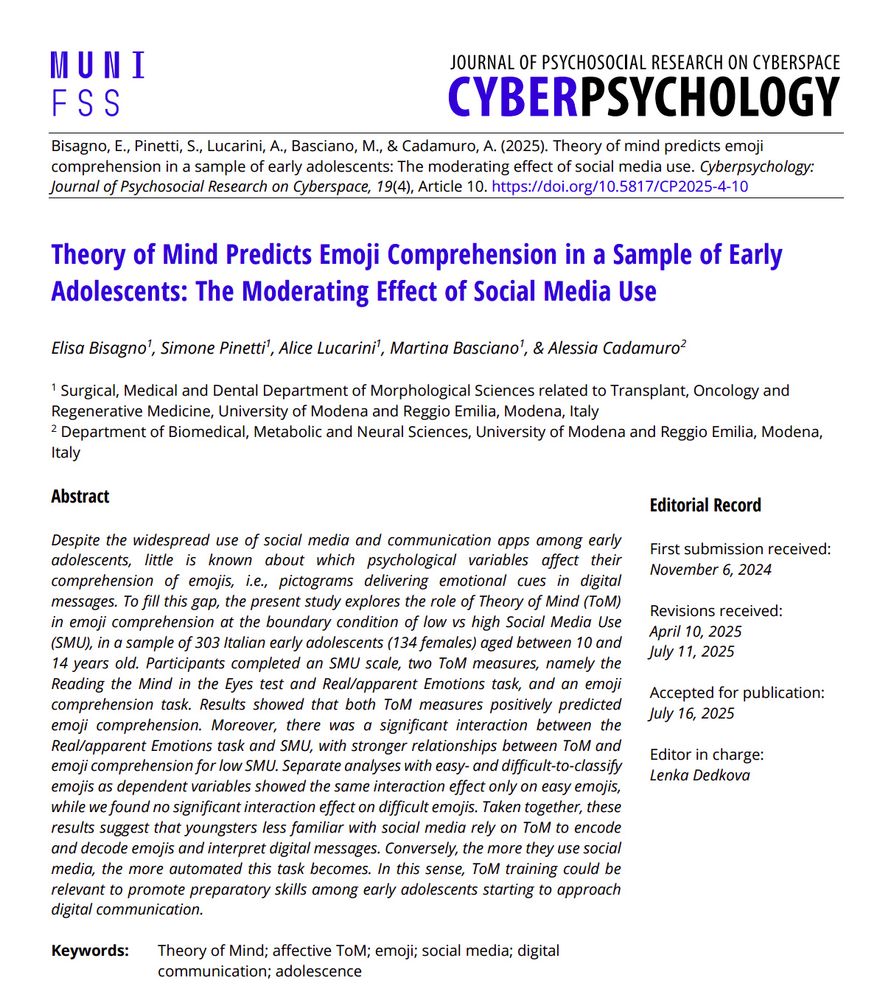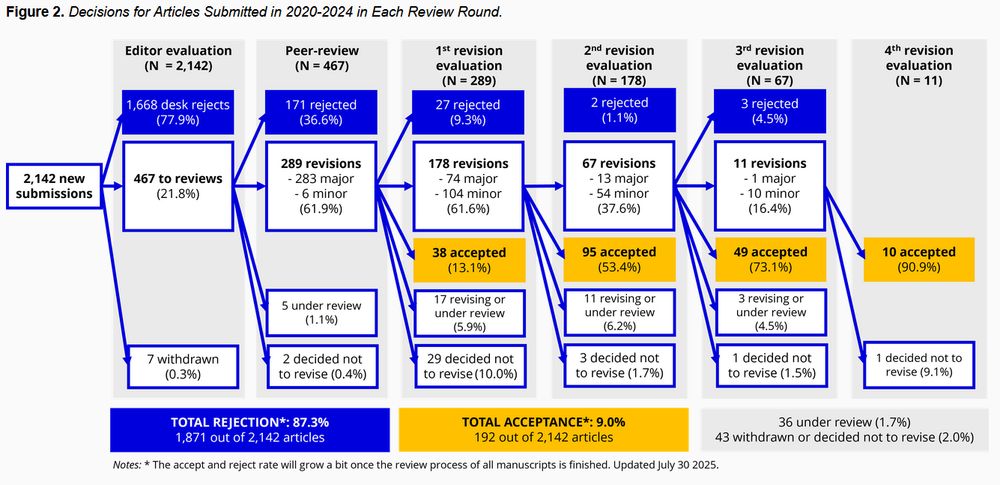
✍ Olga Jiménez-Díaz, Joaquín A. Mora-Merchán, Paz Elipe, Rosario Del Rey
doi.org/10.5817/CP20...

✍ Olga Jiménez-Díaz, Joaquín A. Mora-Merchán, Paz Elipe, Rosario Del Rey
doi.org/10.5817/CP20...
✍ André Markus, Maximilian Baumann, Jan Pfister, Astrid Carolus, Andreas Hotho, Carolin Wienrich
doi.org/10.5817/CP20...

✍ André Markus, Maximilian Baumann, Jan Pfister, Astrid Carolus, Andreas Hotho, Carolin Wienrich
doi.org/10.5817/CP20...
✍ Gabi Schaap, Paul Hendriks Vettehen, Tibor Bosse
doi.org/10.5817/CP20...

✍ Gabi Schaap, Paul Hendriks Vettehen, Tibor Bosse
doi.org/10.5817/CP20...
✍ Elyse F. Hutcheson, Christian Montag, @jonelhai.bsky.social
doi.org/10.5817/CP20...

✍ Elyse F. Hutcheson, Christian Montag, @jonelhai.bsky.social
doi.org/10.5817/CP20...
✍ Wenting Xu, Zeyang Yang, Zhihao Yan, Yuanli Liu, Mark Griffiths
doi.org/10.5817/CP20...

✍ Wenting Xu, Zeyang Yang, Zhihao Yan, Yuanli Liu, Mark Griffiths
doi.org/10.5817/CP20...
✍ Zongyuan Wang, Qinxue Liu, Zien Ding, Di Qi
doi.org/10.5817/CP20...

✍ Zongyuan Wang, Qinxue Liu, Zien Ding, Di Qi
doi.org/10.5817/CP20...
✍ Ilse Vranken, Lara Schreurs, Mireia Montaña Blasco, Laura Vandenbosch
doi.org/10.5817/CP20...

✍ Ilse Vranken, Lara Schreurs, Mireia Montaña Blasco, Laura Vandenbosch
doi.org/10.5817/CP20...
✍ Silvia Marin-Dragu, Matt Orr, Penny Corkum, Benjamin Rusak, Alexa Bagnell, Sandra Meier
doi.org/10.5817/CP20...

✍ Silvia Marin-Dragu, Matt Orr, Penny Corkum, Benjamin Rusak, Alexa Bagnell, Sandra Meier
doi.org/10.5817/CP20...
✍ Jaroslava Kaňková, Sofie Vranken, Jörg Matthes
doi.org/10.5817/CP20...

✍ Jaroslava Kaňková, Sofie Vranken, Jörg Matthes
doi.org/10.5817/CP20...
✍ Michaela Forrai, Kevin Koban, Jörg Matthes
doi.org/10.5817/CP20...

✍ Michaela Forrai, Kevin Koban, Jörg Matthes
doi.org/10.5817/CP20...
Vol. 19, No. 5 has just been published with 10 articles about influencer mental-health, sleep and smartphone use, algorithm vs. human decision-making, and many more.
🔓📖 The full issue is #OpenAccess here: cyberpsychology.eu/issue/view/2...
Enjoy reading!🎀

Vol. 19, No. 5 has just been published with 10 articles about influencer mental-health, sleep and smartphone use, algorithm vs. human decision-making, and many more.
🔓📖 The full issue is #OpenAccess here: cyberpsychology.eu/issue/view/2...
Enjoy reading!🎀
Assistant Professor at @tilburg-university.bsky.social, she studies how people connect across online and offline media—from video calls to chatbots—and how social influencers shape well-being and behavior.
Welcome, Emmelyn!✨

Assistant Professor at @tilburg-university.bsky.social, she studies how people connect across online and offline media—from video calls to chatbots—and how social influencers shape well-being and behavior.
Welcome, Emmelyn!✨
Meme-ingful connections: Unleashing the power of memes, GIFs, and emojis in relationship-oriented online communication
Rachel X. Peng, Jin Chen
doi.org/10.5817/CP20...

Meme-ingful connections: Unleashing the power of memes, GIFs, and emojis in relationship-oriented online communication
Rachel X. Peng, Jin Chen
doi.org/10.5817/CP20...
Theory of mind predicts emoji comprehension in a sample of early adolescents: The moderating effect of social media use
Elisa Bisagno, Simone Pinetti, Alice Lucarini, Martina Basciano, Alessia Cadamuro
doi.org/10.5817/CP20...

Theory of mind predicts emoji comprehension in a sample of early adolescents: The moderating effect of social media use
Elisa Bisagno, Simone Pinetti, Alice Lucarini, Martina Basciano, Alessia Cadamuro
doi.org/10.5817/CP20...
Fear of missing out mediates the relationship between intolerance of uncertainty and problematic smartphone use severity
Nisha Yao, Caleb Hallauer, Elyse Hutcheson, Jon Elhai
doi.org/10.5817/CP20...

Fear of missing out mediates the relationship between intolerance of uncertainty and problematic smartphone use severity
Nisha Yao, Caleb Hallauer, Elyse Hutcheson, Jon Elhai
doi.org/10.5817/CP20...
Convergent and divergent predictors of extensive use time and problematic TikTok use
Ágnes Zsila, Mara S. Aruguete, Reza Shabahang, Ágnes Buvár, Gábor Orosz
doi.org/10.5817/CP20...

Convergent and divergent predictors of extensive use time and problematic TikTok use
Ágnes Zsila, Mara S. Aruguete, Reza Shabahang, Ágnes Buvár, Gábor Orosz
doi.org/10.5817/CP20...
Unravelling social network usage patterns: A study based on unsupervised learning
Alfredo Zarco-Alpuente, Víctor Ciudad-Fernández, Marta Carrique-Martínez, Lucas Serrano-Pastor, Elisabeth Malonda-Vidal, Anna Llorca-Mestre, Rafael García-Ros, Paula Samper-García
doi.org/10.5817/CP20...

Unravelling social network usage patterns: A study based on unsupervised learning
Alfredo Zarco-Alpuente, Víctor Ciudad-Fernández, Marta Carrique-Martínez, Lucas Serrano-Pastor, Elisabeth Malonda-Vidal, Anna Llorca-Mestre, Rafael García-Ros, Paula Samper-García
doi.org/10.5817/CP20...
Bystanders’ perceptions on online hate speech: Investigating the effects of perpetrators’ justifications and the bystander’s role on bystanders’ attitude and prosocial intervention intentions
Sara Pabian
doi.org/10.5817/CP20...

Bystanders’ perceptions on online hate speech: Investigating the effects of perpetrators’ justifications and the bystander’s role on bystanders’ attitude and prosocial intervention intentions
Sara Pabian
doi.org/10.5817/CP20...
Breaking barriers: The impact of intergroup contact on bystanders' actions against bias-based cyberbullying
Raquel António, Rita Guerra, Lindsey Cameron, Carla Moleiro
doi.org/10.5817/CP20...

Breaking barriers: The impact of intergroup contact on bystanders' actions against bias-based cyberbullying
Raquel António, Rita Guerra, Lindsey Cameron, Carla Moleiro
doi.org/10.5817/CP20...
Navigating the digital landscape: Exploring the relationship between social media affordances and Chinese Generation Z’s online prosocial and antisocial behaviors
Wu Li, Pengya Ai, Tian You Guo, Lianshan Zhang
doi.org/10.5817/CP20...

Navigating the digital landscape: Exploring the relationship between social media affordances and Chinese Generation Z’s online prosocial and antisocial behaviors
Wu Li, Pengya Ai, Tian You Guo, Lianshan Zhang
doi.org/10.5817/CP20...
The relationship between usage of social networking sites and meaning in life: Anonymous versus identifiable contexts
Lewis Nitschinsk, Stephanie J. Tobin, Nino Gugushvili, Carly A. McComb, Philippe Verduyn
doi.org/10.5817/CP20...

The relationship between usage of social networking sites and meaning in life: Anonymous versus identifiable contexts
Lewis Nitschinsk, Stephanie J. Tobin, Nino Gugushvili, Carly A. McComb, Philippe Verduyn
doi.org/10.5817/CP20...
Investigating the cross-sectional and longitudinal relationship of X and LINE use with online relationship and life satisfaction: A 4-Year cohort study among Japanese adults
Yu Takizawa
doi.org/10.5817/CP20...

Investigating the cross-sectional and longitudinal relationship of X and LINE use with online relationship and life satisfaction: A 4-Year cohort study among Japanese adults
Yu Takizawa
doi.org/10.5817/CP20...
Does the mere presence of smartphones impact cognition in the high school classroom?
Daniel B. le Roux, Douglas A. Parry, Jennifer Feldman
doi.org/10.5817/CP20...

Does the mere presence of smartphones impact cognition in the high school classroom?
Daniel B. le Roux, Douglas A. Parry, Jennifer Feldman
doi.org/10.5817/CP20...
Vol. 19, No. 4 offers 11 articles about smartphones’ mere presence in schools, social media and life satisfaction, meaning in life, or pro/pro-antisocial behaviors, and much more. See 🧵👇
📖 Read here: cyberpsychology.eu/issue/view/2...
🔓 Everything #OpenAccess
Enjoy!✨

Vol. 19, No. 4 offers 11 articles about smartphones’ mere presence in schools, social media and life satisfaction, meaning in life, or pro/pro-antisocial behaviors, and much more. See 🧵👇
📖 Read here: cyberpsychology.eu/issue/view/2...
🔓 Everything #OpenAccess
Enjoy!✨
Our acceptance rate is around 9%.
BUT most rejections happen after the initial editorial evaluation or after the first round of reviews. So if you get invited to revise the manuscript, the chances of getting published are high!

Our acceptance rate is around 9%.
BUT most rejections happen after the initial editorial evaluation or after the first round of reviews. So if you get invited to revise the manuscript, the chances of getting published are high!

